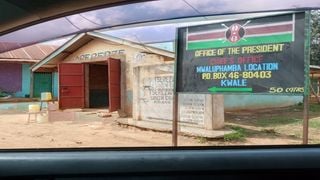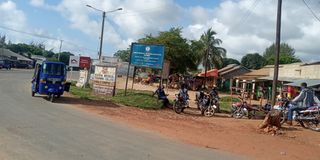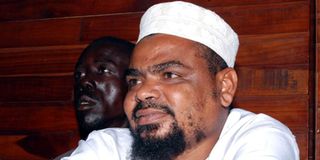
A sign board showing Mwaluphamba location in Kwale, which is one of the villages where youth have been targeted for recruitment to Al Shabaab.
| Mohamed Ahmed | Nation Media GroupNews
Premium
Al Shabaab recruiter with iron grip on Kwale villages
After an hour’s drive from Kombani junction on the Likoni-Ukunda road, you get to Mwaluphamba in Kwale. The journey takes you alongside the famous Shimba Hills National Reserve, one of the largest coastal forests in the region.
Going down the lonely murram road that connects to the reserve – passing the beautiful unspoilt landscape dotted with coconut, cashew and mango trees - an eerie feeling grips you, but the chirping of birds has a calming effect.

Kombani junction which connects to Kwale. Kombani is among areas where some youth were allegedly abducted by people believed to be police officers.
At Mwaluphamba, our sources join us for the mission to uncover the extent of radicalisation, highlighted by the number of youths who have fled to join the al-Shabaab terror group in neighbouring Somalia.
One after the other, homes of people believed to have joined the terror group are pointed out to us.
But an even grimmer story is unfolding 50 kilometres farther, in a remote village called Bongwe.
Risky trip
A day before our trip to Mwaluphamba, our source warned us that travelling to Bongwe was risky, particularly for strangers likely to be mistaken for spies.
Our investigations revealed Bongwe has an active terror cell with a recruiter identified as Musa. Police sources say he is on their watch-list but has been evasive for some time.
“He is the one who knows how to get the youth from the village to Somalia. Currently, he is the one who is in charge. He operates without fear of any person in the village,” revealed our source.
Those who know him say Musa, a short man who is usually dressed in a kanzu, was a religious teacher. Then he turned to terror, but camouflages his activities with community work.
"He has more than one wife. He engages himself in some community works. That's what we know about him," said a villager.
An intelligence source confirmed Musa is among people who are on the police radar due to the recruitment allegations. He is alleged to have recruited several youths from the village, including his brother Hamisi.
A senior police officer told Nation.Africa that Musa is known within security circles.
"He was once arrested in 2016 but, then, he was not known so much. He was yet to become a recruiter. I was among the first people who interrogated him. But there was nothing against him at that time,” disclosed the officer.
Security teams have, however, become more interested in his activities in recent times.
“We are looking for him, but it is not clear where he has been hiding," said the police officer.
Brutal consequences like beheadings
Widows of men who were either abducted or killed due to their involvement in terror have been warned not to speak to any stranger in the area. And the consequences of crossing the paths of the al-Shabaab sympathisers are brutal.
The fear of the terror group in Bongwe is such that the positions of village elders have remained vacant following the killings of the officials. No one is willing to replace them for fear of reprisal.
Mr Omar Shehe, who was also an imam at Mabokoni mosque, and Mr Bakari Dondo, were beheaded in August, last year.
A community organisation official said at least seven villages have not had elders following the killing of the elderly men, until last month, when some men agreed to take up the positions.
The group of al-Shabaab returnees from Somalia are behind the killings of police officers and attacks on petrol stations in Ukunda town.
President Uhuru Kenyatta indeed told Parliament on November 12 a surge in crime particularly assassination of government officials at the South Coast in Kwale is associated with Kenyan fighters returning from Somalia. He confirmed the returnees, who were fleeing from ill-treatment by their counterparts at operation bases in the war-torn Horn of Africa nation, murdered village elders and local government officers at the South Coast.
“The group was active in some areas within South Coast in Kwale County where it assassinated village elders, religious leaders and local government administrators whom they perceived to be working with the Government on the counter terrorism measures,” states a report on the state of national security that the president submitted to Parliament.
“This is in addition to their other efforts aimed at raising funds to finance their activities in the region. However, efforts by the security agencies have managed to dismantle these cells,” the president’s report observes.
The president’s report discloses that the threat of radicalisation and recruitment of youth by terrorist groups was a major concern in some parts of the country including Nairobi, Mombasa and Lamu Counties.
“Al-Shabaab operatives, radicalisers and recruiters mainly targeted vulnerable youths within learning institutions, mosques and madrassas as a soft pool and thereafter facilitating their travel to Somalia to join other militants in their training,” the report discloses.
“Further, the terrorist group stretched its activities to radicalise and recruit from correctional facilities within the country. These activities were given impetus by Kenyan recruiters based in Somalia who mostly exploited the social and family networks to persuade their friends to join their terrorist networks,” the president’s report adds.
A crackdown by the multi-agency security team at the South Coast saw the arrests of recruits, their facilitators and seizure of a cache of weapons, the report says.
Hotbed of recruitment
For long, the Musa mosque in Mombasa was the hotbed for recruiting youths to join the terror group. In recent years, however, Kwale has emerged as the new breeding ground of terrorism.
At Mwaluphamba, at least 10 youths are known to have been recruited to join al Shaabab between 2016 and 2018.
Mr Ali Salim Mwayaga Mwayaga, a recruiter, was shot dead by police in 2016. By then, he had recruited many youths in the area, including his brother Salim and sister Shukran, who is married to an al Shabaab terrorist.
“When the Somali guys came here, that is when Ali started to change his ways. He joined those people who were going round in mosque preaching. After some time, he said he was going to Mombasa to further his religious teachings only for him to vanish,” Ali’s grandmother, Ms Mwanakombo Omar, said when we met her at her home.
After his return to the village, he led his siblings into the terrorist group that ruined their lives, said Ms Omar.
A relative said Salim is currently in Shimo la Tewa prison following his arrest in Mbita, near the Tanzania border, where the suspected al-Shabaab member had set up a camp. His sister is believed to be in Somalia.
A few metres from Ms Omar’s house is Ali’s grave, under a mango tree. It’s a grim ending to the “good child” who strayed onto a deadly path.
Like Ali, hundreds of youths from Kwale have reportedly joined the terror group, recruited by people well known to them. They include nine from Burani village. Other villages where youths have been lost to the terror group are Mlungunipa, Mwamanga, Mbuwani, Kigoti, Shamu and Tiribe.
It is in Tiribe that suspected terrorist Juma Athman Mwengo was killed by police on August 31. He had been on the run for two years.
Mwengo was hiding in the house of Kassim Nassoro Shauti when he was killed. Shauti escaped the police dragnet and is still on the run. A report by a relative seen by Nation.Africa showed that the two appeared suspicious all the time they had their “secret talks”.
Also on the list of villages where men have been recruited to join al-Shabaab in Somalia is Bongwe -- the radicalisation hotbed.
Bongwe is the home of Ramadhan Kufungwa also known as Abu Ayub, the commander of Jaysh Ayman, a unit of the terror group. Ayub is believed to have been recruited by Aboud Rogo, the fiery Mombasa cleric who openly supported al-Shabaab.

Islamic preacher Aboud Rogo Mohammed before a Mombasa court where he was charged with being in procession of illegal firearms before he was killed in 2012. Some of his followers are said to have fled the country.
Rogo, who was on a US and UN sanctions list for supporting al-Shabaab was killed in a drive-by shooting in Mombasa on August 27, 2012. A UN report had blamed him for aiding al-Shabaab to obtain funding and new recruits. The recruitment and radical teachings in Kwale were also blamed on another cleric Samir Khan, an ardent follower of Rogo.
Earlier, in March 2012, Khan and his friend Mohammed Kassim had been pulled out of a public bus in Mombasa by men who had stopped the bus.
The men reportedly identified themselves as police officers. Khan’s body would be found, mutilated, a few days later in the Tsavo National Park. At the time of his killing, Khan was facing charges of illegal possession of firearms and recruiting for al-Shabaab.
Kassim’s whereabouts remain unknown.
The MRC connection
The growing terror activities in Kwale have partly been associated with the rise of the Mombasa Republican Council (MRC), a secessionist group, with recruiters citing shared grievances.
In an interview, Prof Hassan Mwakimako has associated the links between the two groups with the idea of marginalisation of the Coast region.
Unemployment has also been cited to be among major factors that have exposed the youth to both radical and criminal groups in the region.
These, observers say, have brainwashed the youths into the mistaken belief that joining the terror groups will further the fight for their “rights”.
A youth who was about to join the terror group revealed to a relative who spoke to Nation.Africa on condition of anonymity that those who have joined the MRC support the idea of joining al-Shabaab so that they can go to Somalia and be trained.
One area where the idea was being propagated is Kaya Diani, which was raided by police during several operations to flush out MRC members when their secession propaganda was rife.
“It is, however, unfortunate after they go there, they get a different picture from the one they anticipated and that’s why those who are lucky return to their homes,” said a community policing official who has been on a campaign to rehabilitate the returnees.
Police are keeping an eye on Kwale where they have so far killed a number of terror suspects. The officers are also blamed for disappearances of men suspected to be linked to terror activities.
Coast regional police boss Gabriel Musau acknowledged that Kwale has been the focal point of radicalisation.
“We are working with a multi-agency team to focus on the recruiters. We are hopeful that we will manage to stabilise the region like we did with Mombasa,” said Mr Musau.
Human rights groups in the region have accused the police of rights violation through abductions and extrajudicial killings.
Mr Musau, however, denied the claims of police involvement in the abductions and killings, saying they have strictly been operating within the law.
Tomorrow: Why these women widowed in their 20s can’t find new suitors





